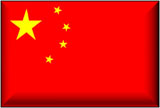Vôtre partenaire pour la Chine : China investieren, Business in China, Beratung über China, in China investieren, Internationalisierung KMB in China
Positive signals from Chinese economy
August, 2013After months of slowdown compared to the growth rates which it had become accustomed, China returns to give positive signals. The resumption of industrial production and foreign trade is accompanied by the transition to a new model of economic development.
The latest figures released on the Chinese economy reflect a more favorable scenario than expected: in particular, comforting the trade surplus of 29.6% recorded in July ($ 17.8 billion) and the growth of industrial production in the same month (+ 9.7%). Also Investment in fixed assets were up: according to statistics released by the National Bureau of Statistics, the increase over the first seven months of the year was 20.1%. The contraction in exports than in previous years and the threat of inflation require, however, the adoption of interventions designed to ensure the stability and, therefore, the economic growth of the Dragon. It ranks in this sense the so-called mini-stimulus to SMEs, that is the set of measures in favor of small businesses in the country, often overlooked in favor of large conglomerates in public ownership.
“China’s undergoing economic restructuring, which sometimes is not in lockstep with growth. We need to sacrifice short-term growth for the purposes of reforms and structural adjustments”.
From August 1 is reduced the tax burden on small businesses with a turnover of less than twenty thousand yuan (about 2,400 Euros), which will be exempt from paying taxes on revenues and VAT. The same companies will benefit also of simpler customs procedures for exports. To take advantage of the bureaucratic simplification will, in particular, the service sector, which accounts for around 46% of the national gross domestic product. To complete this framework there is a stimulus that consists of the offer of tax refunds and confirmation that the yuan will be maintained at a "reasonable" level to push the foreign trade. (www.agichina24.com). This set of interventions is dependent upon the transformation of the Chinese model of economic development, which is shifting more and more towards domestic consumption, given the difficulty of the exports and investment sectors. This change clearly needs a major support from the banking system, that is the main source of financing the economy. The recent reform of credit was designed precisely because of this objective.
.
Services
Notre réseau étendu nous permet de donner un ensemble complet de services de conseil pour investir en Chine. Nous fournissons aide pour l'internationalisation de la PME en Chine en ce qui concerne :
La société
Notre compagnie de consultation soutient chaque phase d'affaires pour le client qui veulent investir en Chine, grâce à nos personnes professionnelles et notre réseau chinois étendu, également appelée « Guanxi ». Il permet à la compagnie (PME en particulier) de réduire au minimum les risques et les déceptions en faire des affaires en Chine.





